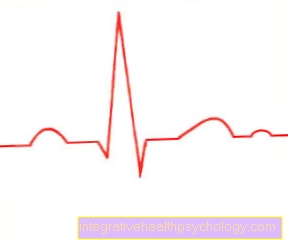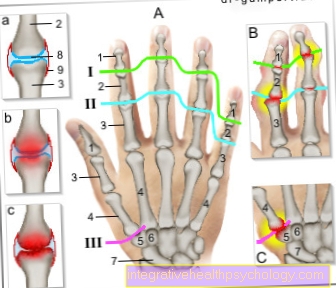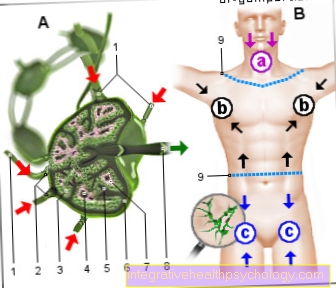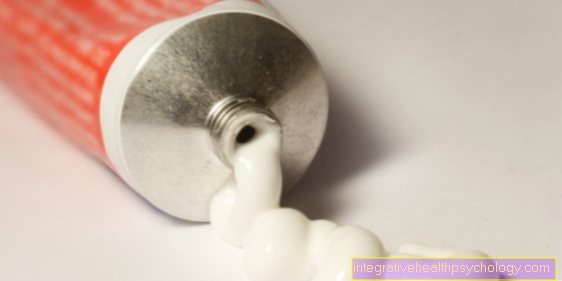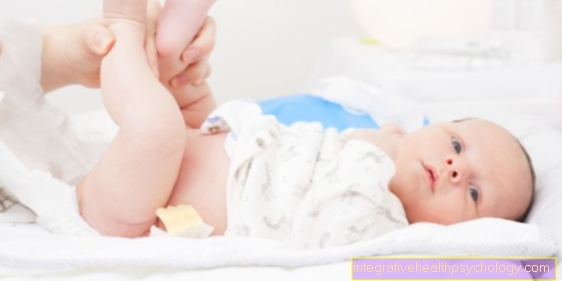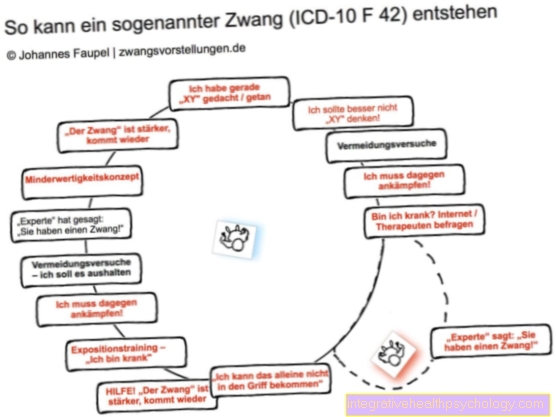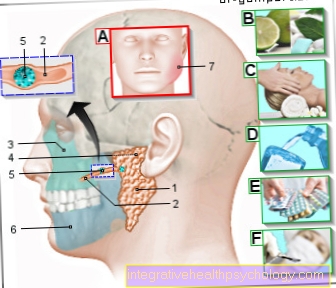Iron Deficiency During Pregnancy
introduction
Iron deficiency during pregnancy means that there is less iron in the blood than the mother and child need.
Iron is absorbed through foods such as meat, but also through pumpkin seeds or dried soybeans. Iron is important for many processes taking place in the body, such as the formation of red blood cells and the functioning of the immune system. Iron deficiency is a common problem during pregnancy and can have consequences for both mother and child.
The iron deficiency is a not uncommon deficiency symptom, which is determined on the basis of blood values. During pregnancy, the limit value is higher than in comparison persons of the same age, since the unborn child also needs iron and thus the need is higher. An iron deficiency can also make itself felt through typical symptoms such as a drop in performance or paleness. The treatment of iron deficiency should be handled conservatively and only after a prior risk-benefit assessment.

Causes of Iron Deficiency During Pregnancy
Numerous changes in the mother's body occur during pregnancy.
The formation of the placenta and the growth of the uterus create a lot of new tissue that has to be supplied with blood. For this reason, the mother's blood production is increased. Because iron is required for this, the mother's iron requirement increases during pregnancy. In addition, nutrients and trace elements must also be passed on to the child's blood. The child's blood is also formed during pregnancy, which in turn increases the need for iron. As a result, the amount of iron required increases proportionally more than the mother's calorie requirement.
The causes can be roughly divided into two groups. On the one hand, there may be a reduced absorption of iron. Iron deficiency can develop particularly during pregnancy, since a pregnant woman has a comparatively higher need for iron than someone who is not pregnant. This is why iron deficiency can occur during pregnancy even with a very balanced diet. Another cause of iron deficiency during pregnancy can nonetheless be a diet low in iron. Vegetarians and vegans are particularly affected by this. In any case, you should discuss your diet with your gynecologist and possibly change it for the period of pregnancy or supplement it with iron tablets. Furthermore, chronic diseases, such as gluten intolerance or chronic inflammation of the intestine, can lead to insufficient iron being absorbed.
The second group of possible causes deals with increased iron loss, for example due to bleeding. Bleeding can also occur during pregnancy. These should then be clarified by the gynecologist, but are a possible cause of a low iron level. Other chronic blood losses such as gastric bleeding, blood donations or cancer can also cause iron deficiency. Furthermore, causes such as slight but prolonged bleeding in the mother's intestine can lead to blood loss without being noticed. Since iron is also lost, this can lead to an iron deficiency during pregnancy.
Read more on this topic at: Causes of Iron Deficiency
What are the signs of iron deficiency?
The first signs of iron deficiency are often difficult to differentiate from general changes in pregnancy. Most symptoms arise from the fact that less blood pigment can be produced. This is usually responsible for the transport of oxygen in the blood. If it is restricted by an iron deficiency, many functions of the body can function poorly.
The first sign of iron deficiency is paleness of the skin and also of the mucous membranes. This pallor can be particularly noticeable in the color of the oral mucosa. Furthermore, so-called corner angular infections can develop. These are small tears at the corners of your mouth that can be painful. They can also be signs of other deficiency symptoms.
Another sign is increasing tiredness and a decrease in performance. To some extent, this is normal in pregnancy. If, however, a clear drop in performance is noticed, an iron deficiency should be clarified. Stress is felt to be very strenuous and breathing difficulties and shortness of breath occur more quickly.
Read more on the subject at: Anemia in Pregnancy.
What are the consequences of iron deficiency during pregnancy?
With a slight iron deficiency there is only a low risk for the unborn child, as the mother's body is designed to first supply the baby with nutrients and then only to itself. So if the mother has a slight iron deficiency, there are initially no deficiency symptoms in the baby. This situation can only change if there is a pronounced iron deficiency. There is evidence that iron deficiency increases the risk of miscarriage and premature birth.
Among other things, iron plays an important role in the immune system in the defense against pathogens. Therefore, an iron deficiency can result in an increased susceptibility to infections. The mother catches a cold more easily or can get infections in the genital area more often. It is important to know that some infections, such as rubella during pregnancy, can have devastating consequences for the development of the child.
Another consequence of iron deficiency can be a reduced performance of the mother, which often occurs with shortness of breath and a racing heart. On the part of the child, a persistent iron deficiency can lead to impairments in development. This can lead to disturbances in the growth of the child's body. In addition, an iron deficiency can result in impaired brain activity in the child. Serious complications such as the increased occurrence of pregnancy poisoning (Gestosis) and inflammation of the kidneys can result. These are very dangerous for the pregnant woman and for the child.
In addition, blood loss is to be expected during childbirth, which pregnant women with anemia are less able to compensate, which can have life-threatening consequences.
Read more on this topic at:
- Consequences of iron deficiency
- Iron deficiency in vegetarians
Concomitant symptoms
Concomitant symptoms of iron deficiency during pregnancy are particularly the consequences of reduced blood formation. Since this means that less oxygen can be transported, the heart has to beat faster, which is noticeable by a racing heart.
- In addition, it can lead to restlessness with trembling legs and sleep disorders.
- In some cases, accompanying symptoms are memory and concentration disorders.
- The growth and stability of the nails can also be affected. These become brittle and so-called hollow nails develop.
- Increased hair loss is not atypical of iron deficiency. If there is a pronounced iron deficiency, even hair will fall out.
- In addition, open, rough corners of the mouth can arise (so-called corner angular rashes) and there is increased inflammation and canker sores in the mouth. Aphthae are painful ulcers that can occur mainly in the mouth area, but also on the genitals.
- Furthermore, the susceptibility to infections is increased because the immune system can no longer work properly.
- In rare cases, the iron deficiency can also lead to Plummer-Vinson syndrome. With this clinical picture, the oral mucosa and also that of the esophagus go under. As a result, these patients report difficulty swallowing and burning of the tongue.
However, it is important to know that, despite a slight iron deficiency, the iron that is still available is first passed on to the child. Therefore, when the mother experiences the first accompanying symptoms, the child's iron supply is usually still sufficient and the child does not have to be expected to be harmed at first.
Read more on the subject at:
- Palpitations during pregnancy
- Sleep disorders in pregnancy
Iron deficiency dizziness during pregnancy
Dizziness is also one of the typical symptoms of iron deficiency. Iron is needed for various processes in the body. For example, if there is an insufficient supply of iron, the body has to fall back on its own reserves. These iron reserves are stored in the red blood pigment hemoglobin. The breakdown of iron from hemoglobin then disrupts another important mechanism. Iron is not only stored in hemoglobin, but also plays an important role in transporting oxygen in the blood. The breakdown of iron can lead to an insufficient supply of oxygen to individual organs. This shows up in the brain with the symptom of dizziness.
In addition, the heart has to beat faster in order to keep the blood supply in the body high enough to compensate for the decreased oxygen transport. For these reasons, iron deficiency can cause dizziness during pregnancy.
You might also be interested in these topics:
- Dizziness from an iron deficiency
- Dizziness during pregnancy
Constipation due to iron deficiency during pregnancy
Many of the iron supplements lead to constipation as well as other gastrointestinal complaints. These occur especially when, for example, the iron tablets are taken on an empty stomach, as should be the case in order to achieve the best possible effect.
For this reason, iron is available with many different binders and herbs, so that you can use another product in the event of side effects and digestive problems.
To combat constipation, you can try taking vitamin C at the same time, for example by drinking orange juice. The vitamin C helps with the absorption of iron and can thus lead to a reduction in constipation. In addition, the digestion can be stimulated with flea seeds or lactose.
More on this under the topic: Constipation in Pregnancy
Treatment of iron deficiency in pregnancy
Whether iron deficiency is treated during pregnancy must always be decided on an individual basis. A risk-benefit analysis must be carried out. This is used to assess whether a therapy with iron supplements is of sufficient benefit to outweigh possible risks.
Particularly in the first trimester, one has to be very careful with the substitution of iron. The therapy takes place either orally, for example by taking iron tablets, or parenterally. In this therapy, the iron can be given via the vein, for example.
- The most common method for this is tablets, which can be taken daily.This is an uncomplicated and quick way of meeting the additional iron requirement during pregnancy and thus preventing an insufficient supply of mother and child. Many doctors prescribe the tablets when an iron deficiency has occurred in order to replenish the stores quickly and effectively. It is particularly important not to take iron tablets with coffee, tea or milk, as this can hinder the absorption of iron.
- Another option is drinking juices, which are usually vegetable-based and contain iron. As a rule, they are dosed lower, which can make it necessary to take them several times a day, depending on the severity of the iron deficiency. These are an alternative if patients cannot take tablets or iron tablets are not tolerated. This type of drink is often combined with substances that improve iron absorption in the body.
- Before a targeted therapy, a change in diet can also be attempted. This can be essential, especially for women who follow a vegetarian or vegan diet. You should not only pay attention to the iron, but also ensure that it does not have any other deficiencies. However, since the iron requirement in pregnancy doubles from 15mg per day to 30mg, women with a normal diet can also benefit from targeted nutritional advice. For example, iron is found in meat, some fruits and vegetables, nuts and soy.
- If it is not possible to take the tablets, the iron can also be given via an infusion into the mother's blood. Here the concentration of iron must always be carefully controlled.
- If the iron deficiency is so pronounced that the hemoglobin value has fallen below 6g / dL blood, a blood transfusion is necessary. This is important because the body needs the blood components faster than it could produce them on its own after the administration of iron.
Combining iron supplements with foods containing vitamin C is helpful as this increases the absorption of iron in the intestine. In addition, care should be taken not to consume any caffeinated beverages or tea one hour before to one hour after taking an iron supplement, as these can reduce absorption.
Since only ten percent of the ingested iron is absorbed through the intestines anyway, ten times as much iron has to be consumed as the body needs. After treatment for iron deficiency, new blood tests should always be carried out. This makes it possible to determine whether the therapy was successful or sufficient.
Learn more at:
- Dietary Supplements During Pregnancy - What You Should Know!
- Homeopathy for iron deficiency
Herbal Blood®
Kräuterblut® is also marketed under the name Floradix.
It can be used as a therapy during pregnancy because, in addition to iron, it also contains other ingredients that are required during pregnancy. The name Kräuterblut® is based on the herbal ingredients that are also contained in the preparation. Herbal blood is a remedy that can be used for the prophylaxis of iron deficiency. It is a liquid that contains dissolved iron and various herbs. The use of iron tablets alone often causes side effects such as stomach pain. The herbs contained in the herbal blood are said to have a beneficial effect on the gastrointestinal tract and prevent these side effects so that the iron is better tolerated.
Read more on the subject at: Herbal Blood®
Ferro Sanol®
Iron tablets containing bivalent iron are sold under the name Ferro Sanol®. They are one of the most common drugs against iron deficiency.
The tablets should best be taken on an empty stomach, as they can then develop the best effect. The iron is then absorbed in the small intestine. On the way there, the tablets first have to pass through the stomach. However, the iron can irritate the lining of the stomach and lead to stomach pain. In order to prevent this and to create better tolerability, iron in Ferro sanol® is coated with a substance that only dissolves after it has passed through the stomach. So the iron can be absorbed well without causing severe side effects on the stomach. The tablets also color the stool black, which is not dangerous. If the gastrointestinal complaints are too pronounced, the tablets can also be taken with a meal.
Read more on the subject at: Ferro Sanol®
Floradix®
Floradix® is also known under the name of herbal blood. You can get it without a prescription in pharmacies or health food stores.
In addition to iron, the company's products also contain folic acid and vitamin B12. Floradix® can be taken during pregnancy if the increased iron requirement cannot be covered by diet alone. However, a doctor should be consulted before taking Floradix® and any other iron preparations, as excessive iron intake can potentially pose risks to the child. Similar to the iron tablets, gastrointestinal complaints can occur when taken and the stool also turns black.
Read more on the subject at: Floradix®
Side effects of iron supplements
It is not just a lack of iron that can have a negative impact on the unborn child. Your doctor can clarify whether an additional intake of iron is necessary during pregnancy. To avoid excessive intake of iron supplements, this should always be discussed beforehand in order to avoid overdosing and unnecessary intake.
- Excessive iron supplement intake can lead to premature births and low birth weight.
- Furthermore, there are cases in which the children may experience abnormal behavior. Studies on this are difficult because ethical principles make it difficult to examine in a structured manner what causes an increased iron intake in children.
- Depending on the pre-existing medication, previous illnesses, etc. Iron intake could be advised against, as symptoms in the gastrointestinal tract could occur. Various medications can increase the gastric stressful effects of iron supplements.
- In addition, taking iron can make other medications less or less effective.
- Side effects of iron administration can include a feeling of fullness, solid stools and even constipation. This can be prevented with plenty of fluid intake. Home remedies such as ingesting psyllium husks can also be beneficial - consult your doctor about this. In addition, it can also happen that the stool turns dark when treated with iron, as not everything can be absorbed by the body and is thus excreted again.
Find out more at: Iron deficiency anemia
diagnosis
The diagnosis is made through a medical history and a blood sample.
The blood count can provide crucial information. The small blood count not only shows different cells in the blood, but also determines how big the red blood cells are and how much hemoglobin (the red blood pigment) they contain. For red blood cells, which are small (microcytic) and low in hemoglobin (hypochromic), an important differential diagnosis is iron deficiency.
In addition to the changes in the red blood cells, you can also look at the total hemoglobin content in the blood count. This is also reduced in the case of iron deficiency. To confirm this, the value for the iron store, the ferritin, is determined at the same time. This value is reduced in the case of iron deficiency and is much more informative than the iron content in the blood.
Read more on the subject at: Iron Deficiency Test
Blood count values
The normal value of the red blood pigment, i.e. the Hb value, in a woman is between 12.3-15.3 g / dL blood. He sinks in during pregnancy 11-15 g / dL blood which corresponds to a perfectly normal adaptation of the mother's body. However, if the Hb value is below 11g / dL blood, this can be an indication of an iron deficiency.
The normal ferritin value is between 15 - 100ng / mL blood. In pregnant women, a ferritin value below 30 ng / mL blood should be viewed critically, as more iron reserves are required and used up in the course of pregnancy.
During pregnancy, it must always be weighed up whether a substitution with iron supplements is beneficial or whether the risk for the unborn child is greater. The limit values are in the first and third trimesters with a hemoglobin value of 11 mg / dl and 10.5 mg / dl in the second trimester. For all hemoglobin values below these limits, iron substitution should be considered.
If the hemoglobin value falls below 6 mg / dl blood, pronounced anemia can be assumed and the pregnant woman may have to receive a blood transfusion.
More information can be found here: Causes of anemia
Recommendations from our editorial team
- Vaccination during pregnancy
- Nosebleeds during pregnancy
- Rash in pregnancy
- Skin diseases during pregnancy
- Pain in the abdomen during pregnancy







